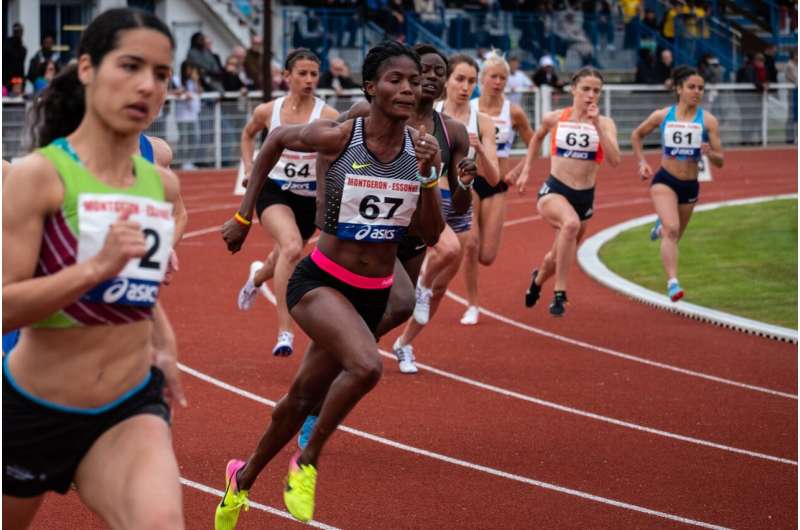This article has been reviewed according to Science X's editorial process and policies. Editors have highlighted the following attributes while ensuring the content's credibility:
fact-checked
trusted source
written by researcher(s)
proofread
From motherhood to medals: New research sheds light on postpartum guidelines for returning to sports

The upcoming 2024 Paris Olympic Games will be historic for a number of reasons. For the first time in modern Olympic history, there will be an equal number of female and male athletes competing at the Games.
The Games will also be more mom-friendly than ever before, thanks to the advocacy of former and current athletes. For instance, a new initiative called MOMentum is creating resources to help athlete-mothers navigate family planning and their careers.
MOMentum is led by Canadian rower Jill Moffatt, alongside fellow Canadian athletes Melissa Bishop-Nriagu, Erica Wiebe, Erica Gavel and two other athletes who almost missed the Tokyo Games due to pregnancy and postpartum policies: basketball player Kim Gaucher and boxer Mandy Bujold.
The French Olympic Committee will also be providing hotel rooms to their athletes for breastfeeding during the Games.
This announcement came after French judoka and Olympic medalist Clarisse Agbegnenou told President Emmanuel Macron during a team visit that she wanted her daughter with her in the Olympic Village to "feel good and be fully committed in my final stretch of the Olympic Games."
In addition, Allyson Felix, an 11-time American Olympic medalist and mother of two, has teamed up with Pampers to set up a nursery in the heart of the Olympic Village.
Concerning lack of evidence
Until recently, many female athletes have had to choose between sports participation and starting a family. However, there is a growing number of Olympian athlete-mothers who have been breaking records and changing the narrative.
Among them is track and field athlete Shelly-Ann Fraser Pryce, who is participating in her fifth Olympic Games at 37, having given birth to a son in 2017. Elle Purrier St. Pierre broke the American record for both the indoor mile and 3000 m at just under one year postpartum. Faith Kipyegon broke her own 1500 m world record on July 7, having had her daughter in 2018.
These athletes are proving that motherhood and elite athletic performance can go hand-in-hand. But despite the increase in athlete-mother successes and improved advocacy, there is still a lack of evidence for a safe postpartum return to sport.
Our research group recently conducted a review on returning to activity/sport guidelines for postpartum women. We found most studies stated that returning to activity could start once "medically safe" around six weeks postpartum, but this term was generally left undefined.
Only 11 out of 36 studies had specific return-to-sports guidelines, and only six studies considered the importance of mental health. A study on elite athlete's experiences returning to sport after childbirth demonstrated that athlete-mothers felt pressures and expectations to return to sports too quickly after childbirth, at a detriment to their physical and emotional health.
Traditional return to sport frameworks after injury involve assessment of strength, endurance and functional abilities, but also emphasize the importance of mental readiness. Our team suggests that returning to sports postpartum should follow a similar framework.
Returning to sport postpartum
Our research proposes a five-step process for postpartum athletes, ranging from return to activity to return to sport.
Before beginning this process, athletes should obtain clearance from a medical professional who has expertise in women's health. These clinicians should offer evidence-based, personalized recommendations and conduct regular follow-ups.
Athletes should be screened for any risk factors that may impede success, such as pelvic floor dysfunction, Relative Energy Deficiency in Sport (REDs) and postpartum anxiety and/or depression.
Instead of focusing on timelines, athletes should progress as tolerance, confidence, goals, and physical and mental readiness indicate. Similar frameworks have been developed that emphasize the importance of a multidisciplinary care team, with a biopsychosocial approach that considers the athlete as a whole person beyond their musculoskeletal system.
A biopsychosocial approach assesses both physical and mental readiness, and includes considering sleep patterns, fatigue, breastfeeding, REDs, psychological well-being, fear of movement, socioeconomic considerations and support systems.
Work still needed to support athlete-mothers
With the right supports in place, athlete-mothers generally report positive experiences when returning to sport. More than half may return to at least their pre-pregnancy performance level, and some will even exceed it.
Beyond performance and podiums, their new "dual identity" can result in a newfound sense of pride, motivation, resilience and enjoyment for their sport. Beyond sport, exercise and physical activity during pregnancy has long been shown to have positive health outcomes for both mother and baby, making the benefits a win-win for more than one generation.
While there have been large advances and successes for athlete-mothers and progress since the 2020 Tokyo Olympics, there is still work to be done to improve postpartum care and support.
We need more high-quality research to inform evidence-based recommendations for postpartum policy and clinical practice. Sports policies organizations and sponsors must evolve to support athlete-mothers, to navigate a safe return to sport.
This will reduce the likelihood of long-term injury, alleviating the decision between becoming a mother or remaining an athlete. If we can improve the overall health and well-being of athlete-mothers as well as promote longevity in sport, then female athletes can live in a world where competing after pregnancy becomes the norm.
This article is republished from The Conversation under a Creative Commons license. Read the original article.![]()




















